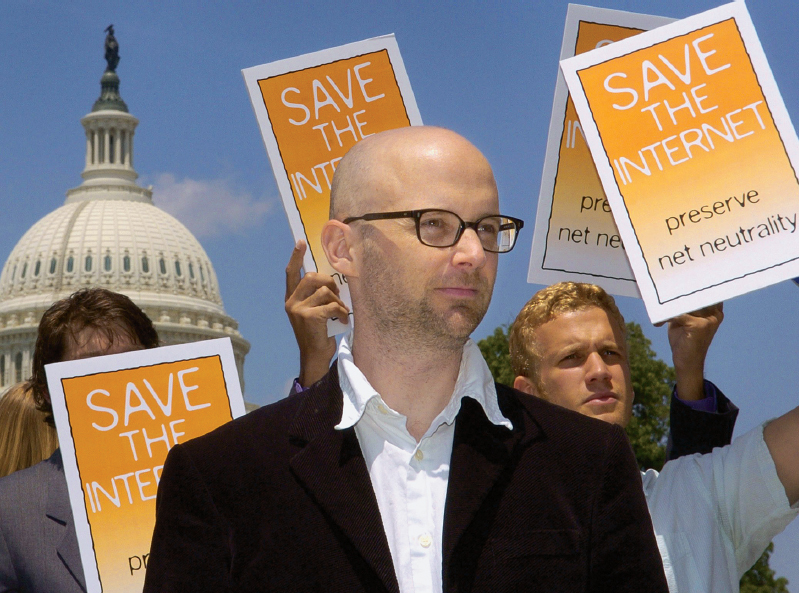Printed Page 274
MEDIA LITERACY
Case Study

Net Neutrality
For every mass medium, there comes a pivotal time where society must decide whether it will be a democratic medium or not. Now is that time for the Internet. The issue is called “net neutrality,” and it refers to the principle that every Web site—one owned by a multinational corporation or one owned by you—has the right to the same Internet network speed and access. The idea of an open and neutral network has existed since the origins of the Internet, but it has never been written into law.
But now major telephone companies and cable companies, which control 98 percent of broadband access in the United States (through DSL and cable modem service), would like to dismiss net neutrality and give faster connections and greater priority to clients willing to pay higher rates. The companies who want to eliminate net neutrality, including AT&T, Verizon, Comcast, Time Warner, and Qwest, explain that the money they could make with multi-tier Internet access will give them the incentive they need to build expensive new networks; however, many think it is a scheme to make more money.
One of the main groups in favor of preserving net neutrality is SavetheInternet.com, a nonprofit coalition of more than one million people, mostly bloggers, video gamers, educators, religious groups, unions, and small businesses. Even large Internet corporations like Google, Yahoo!, Amazon.com, eBay, Microsoft, and Facebook support net neutrality, because their business depends on their millions of customers having equal access to the Web. SavetheInternet outlined some of the threats posed by an Internet without network neutrality rules:
- Small businesses. The little guy will be left in the “slow lane” with inferior Internet service, unable to compete.
- Innovators with the next big idea. Start-ups and entrepreneurs will be muscled out of the marketplace by big corporations that pay Internet providers for the top spots on the Web.
- iPod listeners. A company like Comcast could slow access to iTunes, steering users to a higher-priced music service it owns.
- Political groups. Political organizing could be slowed by a handful of dominant Internet providers who ask advocacy groups to pay “protection money” for their Web sites and online features to work correctly.
- Nonprofits. A charity’s Web site could open at snail-like speeds, and online contributions could grind to a halt if nonprofits don’t pay Internet providers for access to “the fast lane.”
There is some hope for net neutrality. The SavetheInternet coalition is petitioning Congress to make a free and open Internet permanent with a net neutrality act. The movement has bipartisan sup-port, but the telecommunications industry has already spent more than $175 million in lobbying, campaign contributions, and phony grassroots organizations to kill net neutrality, so passage is not a certainty.
In the meantime, Internet rights advocates have faced other challenges. In 2012, Congress considered both the Stop Online Piracy Act (SOPA) and the Protect IP Act (PIPA), bills designed to give the government and rights-holders greater power to enforce copyright laws—power some advocates worried could damage the freedom of the Internet, as well as free speech. To protest this bill, many popular Web sites, including Wikipedia and Reddit, went “dark” on January 18, 2012, replacing their content with an anti-SOPA message. Shortly thereafter, votes on both bills were postponed, and SOPA will be redrawn. But the fights over net neutrality and copyright protection are far from over.
APPLYING THE CRITICAL PROCESS
DESCRIPTION Interview a sample of people about their views on net neutrality. Would they be willing to pay higher rates for faster connections? Do they think every Web site should have the same network speed and access?
ANALYSIS What sort of patterns emerge from your interviews? Are there common views on the way the Internet should be accessed? Do the interviewees seem to be concerned, or unconcerned, about the issue of net neutrality? Do your questions make them think about this issue for the first time?
INTERPRETATION What do these patterns mean? Is the idea of net neutrality better or worse for democracy? Would eliminating net neutrality undercut the usefulness and accessibility of the medium?
EVALUATION Is net neutrality a benefit of the Internet? What should the standards of speed and access to it be? How should they be enforced?
ENGAGEMENT Learn about and take action for or against net neutrality. Visit SavetheInternet.com to learn how to prevent net neutrality’s elimination. Share your knowledge with your peers.